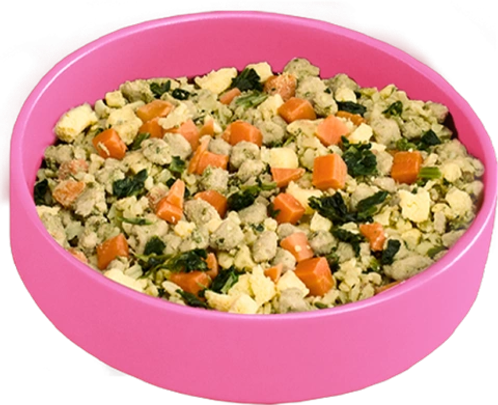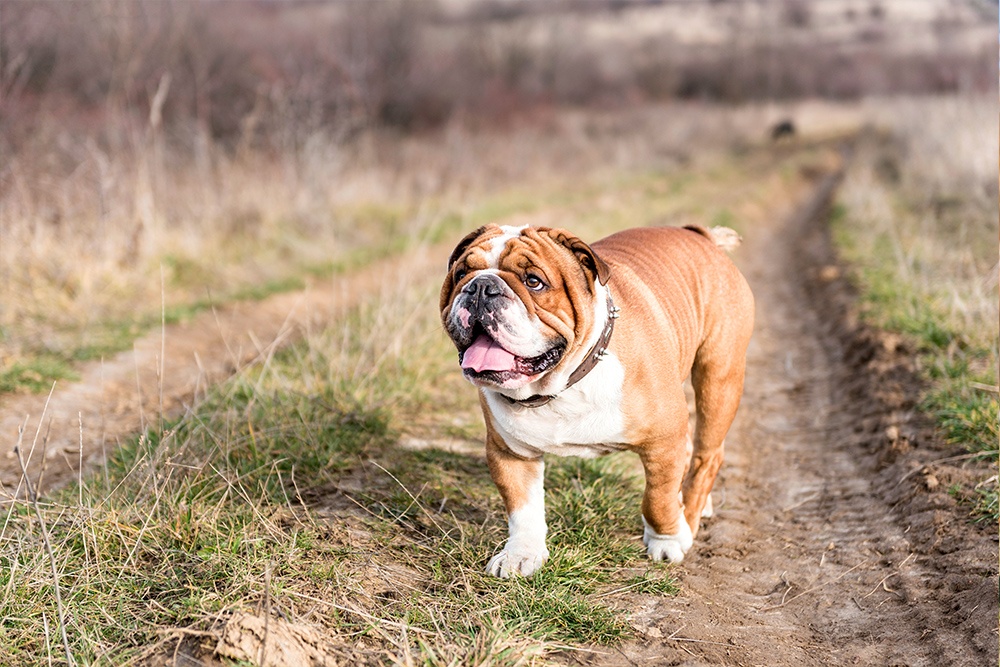Calm, intelligent and docile, the English Bulldog is the perfect family dog. Unfortunately, the English Bulldog is also predisposed to developing skin allergies, whether it’s from genetics, food allergies or environmental factors.
Type of Coat
The English Bulldog has a straight, smooth and short coat that is fine and glossy. Their skin is loose and soft around the head, shoulders and neck, while the head itself is covered with heavy wrinkles. The breed is also known for having a “dewlap”, which is two loose folds of skin at the throat. The English Bulldog is an average shedder that should be brushed weekly. Their faces should be wiped daily to avoid irritations developing around their face wrinkles and folds.
Susceptibility to Skin Allergies
The English Bulldog’s unique skin folding can lead to dermatitis, folliculitis and muzzle acne. The areas between the skin folds and wrinkles on the English Bulldog can become irritated and itchy, leading to yeast and other infections. In the skin folds or the ears, infections can cause itchiness, redness and an accumulation of brown wax; on the skin itself, it leads to either flaky, scaly skin or oily, greasy skin.
Environmental conditions such as parasitic infections like demodex can also cause skin inflammations and allergies in the English Bulldog. Demodex is a microscopic mite that lives on dog hair follicles and English Bulldogs can be tormented by these little guys.
The Connection Between Food and Skin Allergies
English Bulldogs are prone to developing food reactions and may have two different causes for food related issues: food intolerance or food allergies.
Typically, the source of food intolerances and allergies are animal proteins like chicken, beef or pork. Other causes of food allergies are corn, eggs and milk. Skin allergies due to a food allergy can also combine with gastrointestinal illness to create a multi-faceted problem.
Common Allergy Locations
English Bulldogs experience skin allergies on their paws, legs, face, ears, sides, stomach and hind end. If your English Bulldog chews, bites, or scratches excessively at any of these areas, he is most likely reacting to an allergy. Additional allergy symptoms include hair loss, flaky skin and dandruff.
The ears and eyes are two common locations for allergic inflammations to occur. Check for red, irritated, teary eyes and ears that are reddened and itchy. The ears must be carefully monitored to prevent painful infections that can damage hearing if left untreated.
Treatment Options
Sulfate-free, organic, hypoallergenic shampoo can help calm your dog’s irritated skin; additional ingredients like aloe vera and hydrocortisone are anti-inflammatories that also aid in reducing itchiness and inflamed skin. For hot spots and lesions, an organic spray or antihistamines and topical creams can help.
Food intolerances and allergies are difficult to diagnose. Speak to a veterinarian, allergist or board-certified veterinary nutritionist to see if a food allergy is the basis for your English Bulldog’s skin allergies and irritations.
Through an elimination diet, your vet can help you determine which animal proteins are the source of the allergy. Fresh food diets and single-ingredient diets are some of the best ways to diagnose food allergies. To try an elimination diet with your English Bulldog, follow these steps:
- Feed your English Bulldog a new, single-ingredient food for eight weeks. A single-ingredient diet will provide the best results.
- The elimination diet food should contain only single sources of animal protein, carbohydrate calories and vegetable protein. (Example: fish and potato or rabbit and peas.)
- For eight weeks, do not feed your English Bulldog any treats, flavored medications, table food or supplements. These ingredients can impact the elimination diet assessment.
- When the eight weeks have concluded, slowly switch your English Bulldog back to his regular food and watch for any allergies to reappear.
You may also want to do some research into probiotics for dogs. Probiotics work to build stronger digestive and immune systems, as well as reducing inflammation. Recent studies show that probiotics are an excellent tool for managing canine allergies and improving the immune system.
You also may want to consider switching your English Bulldog to a fresh food diet. While dry kibble has a longer shelf life, it often fails to provide the full array of vitamins and nutrients your English Bulldog needs. On the other hand, a fresh food diet contains essential healthy fats like Omega-6 and Omega-3, plus Zinc and amino acids that can work to calm inflammatory reactions to allergens. Here are a few dietary suggestions to help your English Bulldog’s allergies:
| Condition | Dietary Needs and Adjustments |
|---|---|
| Coat Color Changes | Increase amino acids which can be found in protein (>75 grams per 1000 calories); use our calculator to convert a label percentage to the caloric basis (grams per 1000 calories) |
| Concurrent GI Signs | Avoid foods with tryptamine and histamine, such as dairy or fermented vegetables and meats (yes, this includes bacon); try a simple ingredient food trial |
| Chronic Itching and Dermatitis | Fortify the diet with Vitamin E, B Vitamins, Zinc, omega-6 and the omega-3 fatty acids found in fish oil; add a probiotic; try a simple ingredient food trial |
| Dull Coat and Scaling | Adjust EPA and DHA levels in the diet (added fish oil being the most common way); try a food that has added zinc |
| Dandruff and Crustiness | Add Zinc and Vitamin A levels |
About Nom Nom
Each serving of our custom-made, fresh food contains Nutrient Mix, which includes Vitamins E and A for the skin and coat, and zinc, magnesium and selenium for additional immune system support — all of which could potentially help with your English Bulldog’s skin allergies.




